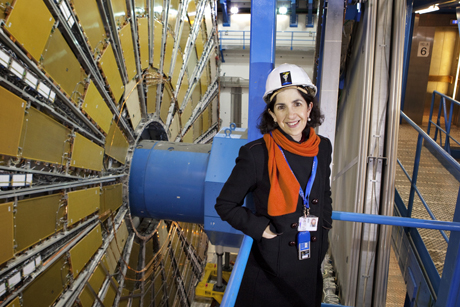Higgs boson discoverer to give Bethe lecture

Physicist Fabiola Gianotti announced in July 2012 that a team at CERN had discovered a particle consistent with the Higgs boson, predicted by the Standard Model of particle physics, that is crucial to understanding physics and the structure and evolution of the universe.
Gianotti will discuss the unprecedented challenges that were overcome to find the once-theoretical elementary particle Wednesday, Nov. 13, at 7:30 p.m. in Rockefeller Hall’s Schwartz Auditorium, in a free public lecture, “The Higgs Boson and Our Life.”
Gianotti has been a senior research physicist at CERN since 1994, involved in detector research and development and construction, software development and analyses of recorded data. She served as the coordinator and spokesperson for the ATLAS Collaboration of 3,000 scientists from 38 countries, whose experiment at the Large Hadron Collider found evidence for the Higgs boson.
The Guardian newspaper listed Gianotti among the top 100 most inspirational women in 2011, and she was runner-up in 2012 for Time Magazine’s Person of the Year. She received the 2012 Special Fundamental Physics Prize and in 2013 the Niels Bohr Institute Medal of Honor for her contribution at the ATLAS experiment at CERN. Gianotti received her Ph.D. in subnuclear physics from the University of Milan, Italy, in 1989.
As part of the Bethe lecture series, Gianotti will also present a physics colloquium, ”Challenges and Accomplishments of the ATLAS Experiment at the Large Hadron Collider,” Monday, Nov. 11, 4 p.m. in Schwartz Auditorium, Rockefeller Hall; and a Laboratory for Elementary-Particle Physics informal seminar, “Most Recent Results From Higgs Boson Studies in ATLAS and Their Implications,” Tuesday, Nov. 12, at 4 p.m. in 701 Clark Hall.
The Hans Bethe Lectures, established by the Department of Physics and the College of Arts and Sciences, honor Bethe, a Cornell professor of physics from 1936 until his death in 2005 who won the Nobel Prize in physics in 1967 for his description of the nuclear processes that power the sun.
Media Contact
Get Cornell news delivered right to your inbox.
Subscribe